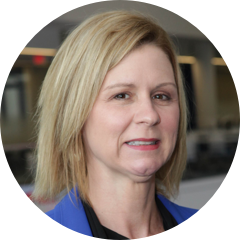Dee Steinle, Executive Director of MBA and MSB Programs at the University of Kansas (KU) School of Business, faced a common managerial challenge. She was asked to walk the proverbial tightrope — grow enrollment without additional resources. In the highly competitive marketplace for GME, overall enrollment has been fairly static while the number of offerings has dramatically increased. Enrolling a class of MBA students who have the chance to improve rankings has become so competitive, in fact, that some schools have started offering their degrees at zero cost to attract top students. Steinle needed to determine how to grow enrollment in a rapidly changing environment, and do so without any additional resources.
As she was walking to her office on the last day of final exams for Q1 one fall afternoon, a student approached Dee Steinle, Executive Director of MBA and MSB Programs at the University of Kansas (KU) School of Business, and said, “I’m making an app like Tinder, but exclusively for paleontologists; I’m calling it ‘Carbon Dating.’” Steinle found herself still laughing as she sat down at her desk moments later. It’s not uncommon for students to form quick relationships with Steinle. With an optimism that takes the form of an easy smile and the patience of a monk, Steinle often tells students that she would have been a paleontologist if she weren’t a dean. “Carbon dating,” Steinle chuckled as she logged onto her computer to a strategic planning template she was completing. Widely seen as an enrollment jedi, Steinle was spending a lot of time finessing the phrasing in her “Enrollment Goals” section. Of course, enrollment targets are growth targets, but Steinle knew enrollment would be more of a challenge that year because she had to confront the perennial problem of doing more with less. Without significant resources available in time or staffing, she needed to find a way to meet the growth goals that the school increasingly relied upon to support their innovation and community building efforts.
For almost 100 years, the School of Business at KU has been offering graduate management education (GME) that emphasizes practical application and exposure to leading researchers. Today, the School of Business offers a balanced portfolio of programs with a multi-platform MBA and four MS degrees. Cohorts are kept small to focus intensively on the classroom and case method dynamics, and in the School’s well-regarded FTMBA program, students and grads alike consistently give the school high marks across all of the rankings surveys.
At KU, enrollment in the FTMBA program has long been targeted to a class size of 40, but like many schools in the late 2010s, enrollment in the FTMBA program has become increasingly harder to predict. High competition among schools for applicants with rankings- and employment-friendly profiles has long been de rigueur for MBA programs, but the rise in quality and number of international competitors, a complex and sometimes challenging US student immigration system and a dramatic shift in program cost dynamics paired with escalating scholarship competition has had a chilling effect on the FTMBA enrollment at the majority of schools. KU was certainly not immune to these challenges, and as such, the year-over-year application-to-enrollment yield at most schools was a tense roller coaster for leaders like Steinle.

